Analysis
Why playing it safe on immigration and crime could be a big risk for Harris
Published
8 months agoon
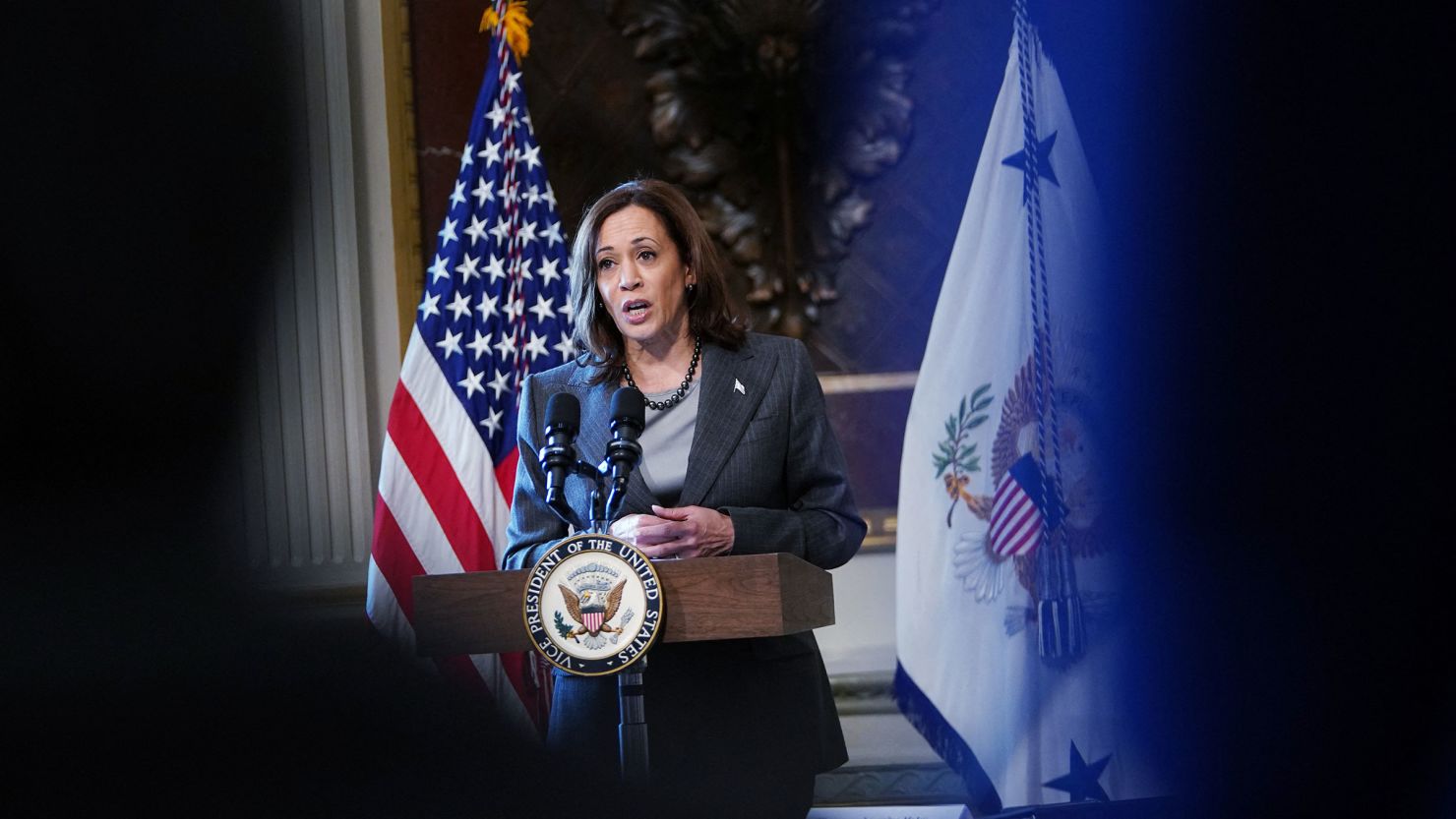
Analysis by Ronald Brownstein, CNN
13 minute read
Published 7:11 PM EDT, Mon September 9, 2024
In this February 2023 photo, Vice President Kamala Harris speaks in Washington, DC, on the root causes of migration from northern Central America. Mandel Ngan/AFP/Getty ImagesCNN —
Vice President Kamala Harris has so far largely avoided confronting Donald Trump on some of his most racially inflammatory policy proposals – even as she continues to underperform among the Hispanic and Black voters who could face the harshest consequences from the former president’s plans.
Not calling out his ideas for the mass deportation of undocumented migrants, for example, or the pressure he wants to put on local governments to adopt tougher policing tactics is a cautious strategy that may reflect the unease in some Democratic circles about bringing attention to the volatile issues of immigration and crime. But it could also deny her some of her best potential tools to pry back some of the Black and Hispanic voters among whom most polls show Trump is still running better than in 2020.
Since Harris replaced President Joe Biden as the Democratic nominee, Trump has constantly attempted to portray her as weak on immigration and crime. The former California attorney general has sought to rebut those charges by emphasizing her toughness on those questions – especially her prosecutorial background in a border state – and highlighting Trump’s torpedoing of a bipartisan border deal. But the real question for many of the groups working on these issues is whether she tries to turn the tables by portraying Trump’s solutions to these problems as extreme, impractical and racially divisive.
Gary Segura, a pollster who works with UnidosUS, a leading Hispanic advocacy group whose sister organization UnidosUS Action Fund has endorsed Harris, said that the vice president was missing an opportunity by avoiding a confrontation with Trump over his mass deportation plans, for example. “We have done focus groups and polling both for Unidos and for other organizations [and] overwhelmingly mass deportation is not a popular position,” among Hispanics, Segura told reporters last week while releasing a new Unidos national survey of Hispanic voters. “But it is not particularly well known. Many of the people we speak to believe he will do it if he can, but they just don’t actually believe that he can pull that off.”
On both immigration and crime, Trump this year is running on an agenda significantly more aggressive than he proposed either in 2020 or 2016.
In effect, Trump is gambling that he can energize his base of culturally conservative White voters with these hardline ideas, while also attracting an increased share of non-White voters on other issues, starting with the economy. The reluctance of the Harris campaign, and the leading Democratic interest groups, to confront Trump more directly over his proposals is increasing the odds that gamble will pay off.
Among the immigration issues that Harris and liberal groups supporting her have almost completely ignored are Trump’s pledge to implement a mass deportation of undocumented immigrants; his call to end birthright citizenship for the children of those immigrants; and his refusal to rule out reviving his policy of separating migrant parents from their children at the border (which his running mate, Ohio Sen. JD Vance, on Friday also suggested could be reprised).
In his Wisconsin campaign rally on Saturday, Trump warned that deporting at least some of the migrants he intends to target “will be a bloody story.”
Democrats have also said little about Trump’s suite of aggressive crime policy proposals. These including mandating that local police departments adopt “stop and frisk” tactics as a condition of receiving federal law enforcement aid, while simultaneously passing federal legislation making it more difficult to sue police officers for misconduct. (He touted those ideas again last Friday when receiving the endorsement of the Fraternal Order of Police.) Trump has also talked openly about deploying the National Guard into high-crime cities over the objections of local governors and mayors.
These programs’ cumulative impact on minority communities could be enormous. Trump has repeatedly promised to pursue “the Largest Domestic Deportation Operation in History,” as he has phrased it on social media. Stephen Miller, Trump’s top immigration adviser, has publicly discussed plans to build a massive deportation force composed of federal law enforcement officials from a wide array of agencies, local police and sheriff’s departments, and even National Guard troops provided by sympathetic red state governors, to “go around the country arresting illegal immigrants in large-scale raids.” Undocumented migrants, Miller continued, would then be transferred to massive internment camps – “large-scale staging grounds near the border, most likely in Texas” – from which they would returned to their home countries through near-constant flights.
Deportations at even a fraction of the pace Trump is promising could be enormously disruptive to the Hispanic community and the broader economy.
Michael Ettlinger, the founding director of the University of New Hampshire’s Carsey School of Public Policy, wrote last week in the Boston Globe that mass deportations of undocumented immigrants could remove from the workforce 22% of all farmworkers, 15% of construction workers, and 8% of both manufacturing and service workers, including child care providers. Economic forecasters at groups such as Moody’s Analytics and Goldman Sachs have cited that potential disruption to the labor force as a key factor in their projections that Trump’s agenda would reignite inflation and slow domestic growth.
Simultaneously, widespread deportations could touch millions of Hispanics beyond those here illegally. According to unpublished new research provided to CNN, Jeffrey Passel, a senior demographer at the Pew Research Center, estimates that about 15 million Hispanics, or roughly one-fourth of the entire US Hispanic population, live in so called “mixed status” families, where at least some members are undocumented. Those 15 million people divide roughly equally between those who are here illegally and those who are legal residents – including nearly 4 million US-born citizen children of undocumented parents, Passel calculates.
The implications of Trump’s criminal justice agenda are nearly as sweeping. In one of his “Agenda 47” videos outlining his second-term plans, Trump said he “will require local law enforcement agencies receiving [federal] grants to return to proven policing measures such as stop-and-frisk.” That refers to the policy, instituted most aggressively in New York City under Mayors Rudolph Giuliani and Michael Bloomberg, of stopping large numbers of people to search for drugs or guns; eventually a federal judge ruled the program violated the rights of minorities, who were disproportionately targeted in the stops, and the city abandoned the policy. Black and Hispanic young men between the ages of 14-24 accounted for over 40% of all those stopped under the policy, even though they account for less than 5% of city residents, according to a report by the NYCLU.
Advocates for police reform say that requiring cities to implement some version of the stop-and-frisk approach while also passing federal legislation strengthening the “qualified immunity,” which protects police against lawsuits over misconduct (as Trump has also promised), would inevitably result in many more arrests of young Black and brown men each year. “If that is something cities take on across the country … there will be millions of [more] police stops,” mostly of younger Black and Latino men, said Ed Chung, vice-president for initiatives of Vera Action, a group that advocates for policing reform. “And if the numbers hold true to what the New York Police Department experienced, 90% of those will be stops for no reason.”
Yet despite these potentially massive impacts, Trump’s immigration and criminal justice ideas have received relatively little attention in the campaign from anyone – the media, liberal interest groups or the Harris campaign.
Harris did not mention the threat of mass deportation in either Phoenix or Las Vegas, two cities with very large Hispanic populations, when she appeared in them on her initial campaign swing with her running mate, Minnesota Gov. Tim Walz. And while, in all her stump speeches, she alludes to the prospect that Trump’s proposed tariffs will inflate prices, she pointedly omits any mention of the mass deportation program that economists consider an equal inflationary risk. On Friday, Harris also chose not to mention mass deportation during a radio interview with Univision, when the host asked her to summarize her argument to undecided Hispanic voters. Nor has Harris criticized Trump’s plans to pressure cities to implement tougher policing policies, even when she’s appeared in cities with large Black populations, such as Philadelphia, Atlanta and Savannah.
The Harris campaign, based on my conversations with people familiar with its thinking, has not engaged in these fights largely because it believes that the remaining minority voters up for grabs are mostly motivated by the same economic concerns as the White electorate. It wants Harris to be seen primarily as focusing on those bread-and-butter concerns. To the extent Democrats want to highlight some of Trump’s more extreme ideas, the campaign believes that work could be done more usefully either by surrogates, paid advertising, or groups in the broader Democratic universe – rather than Harris personally engaging the former president, according to the sources familiar with the campaign’s strategy.
Still a growing number of Democratic activists focused on rallying Black and Latino voters are clearly eager to hear Harris and other party leaders challenge the Trump agenda more directly.
“There is a way in which those [crime and immigration] issues in particular are also about bigger things,” said Adrianne Shropshire, executive director of BlackPAC, a group working to mobilize Black voters for Harris and Democrats. “They are about values. There is a way to talk about them that is fundamentally about who are we and who do we want to be as nation, which she is really good at. People are quite tired of being the worst version of ourselves, and I think that contrast is really important to make.”
Segura, the pollster who works with UnidosUS, said that while a measurable segment of the Hispanic electorate supports hardline approaches on immigration they tend to be “the voters who lean in the GOP direction in the first place.” As a result, he added, “I don’t see a lot of risk” for Harris to push back against Trump’s deportation plans “particularly in targeted advertising to Hispanic voters.”
Tom Wong, founding director of the US Immigration Policy Center at the University of California at San Diego, has tested public opinion on mass deportation for another immigration advocacy group, America’s Voice. Wong said that while mass deportation initially draws substantial public backing, support for the idea dwindles both among Hispanics and the broader population when people are informed that such a program could sweep up people who have been in the US for years without breaking the law and may have US citizen children.
“Once we can put a human face on the idea of an undocumented immigrant being rounded up and deported, then the general public takes a step back,” Wong said.
A national poll by Marquette Law School in Wisconsin earlier this year confirmed that dynamic. A May survey found that when part of the sample was asked, “Do you favor or oppose deporting immigrants who are living in the United States illegally back to their home countries?” over three-fifths said they did. But that support flipped to majority opposition among another group of respondents who were asked if they would support deportations even of people who “have lived here for a number of years, have jobs and no criminal record.”
Raising the prospect of the detention camps that would be required for mass deportation may also depress support for the idea. New polling released last week by the non-partisan Public Religion Research Institute found that over three-fifths of all Americans opposed deporting all undocumented immigrants “even if it takes setting up encampments guarded by the US military.” Fully 7-in-10 Hispanics said they opposed that idea, according to unpublished results provided to CNN.
Not as much public polling is available on the specifics of Trump’s policing agenda. But Daniela Gilbert, director of Vera’s Redefining Public Safety initiative, says that the group’s private surveys consistently show widespread public backing for a comprehensive agenda of providing support to police departments, but also insisting on accountability for police misconduct and promoting alternative approaches to community safety, such as greater mental health intervention and drug treatment. That’s largely the mix of policies the Biden administration has advanced, Gilbert noted.
“Our polling data really shows that Harris will leave votes on the table if her campaign is silent on the need for better and more accountable policing,” Gilbert said. “Talking about those policies can garner more support, whether or not that is framed in direct response to Trump’s outlandish policies, or really focused on the track record she has in advocating for greater accountability.”
Anthony Baber, director of communications and culture at Detroit Action, a grassroots group that mobilizes working-class and younger voters of color in that city, points to another reason for Harris to amplify the volume on these issues. He said her emphasis on her prosecutorial background has caused some of the voters of color the group is trying to reach to question the distance between her and Trump on issues relating to criminal justice. Harris, Baber believes, needs to more clearly separate herself from Trump on that front.
“Trump is kind of benefiting from the perception of Harris as the super cop,” Baber said. “I think there’s a lot of people who see [her history as a prosecutor] and wonder if [she] is a more compassionate candidate when it comes to criminal justice reform, because it is not coming through as clearly as a difference between these two candidates.”
Harris nonetheless has plenty of reasons to minimize her exchanges with Trump around immigration and crime. Some Democratic strategists agree with the campaign assessment she has a better chance to reach the non-White voters now considering Trump by emphasizing economic messages rather than the threat he could pose to them on these issues.
Polls also consistently show that many more voters trust Trump than Harris on immigration – he led her by double-digits on the issue in all six of the swing states in CNN’s survey last week. She’s narrowed Biden’s overall deficit to Trump on trust to handle crime. But among White voters, she trailed Trump by at least 22 points on immigration in all of the states CNN polled except Michigan and Wisconsin, where she trailed more narrowly; on crime, she trailed him by at least 17 points with Whites everywhere except those two states, where again she trailed more narrowly.
Given those deficits, some of the activists focused on Black and Hispanic voters believe the party has concluded that any time spent talking about immigration or crime is a net negative for them – even if they are trying to focus attention on Trump’s controversial responses. To the extent Harris and other Democrats are addressing these issues at all, many of these activists believe, they are emphasizing a message of toughness rather than equity. “I think that Democrats have been scared away [from] talking about immigration because of the record numbers of arrivals at the southern border,” said Wong, alluding to the high number of border crossings late last year that fed GOP attacks on the Biden administration but have since markedly decreased. Chung of Vera Action similarly says that the increase in crime around the pandemic – which has since largely receded – has discouraged not only Democratic office-holders but the broader constellation of progressive groups from more forcefully pushing alternatives to hardline policing policies.
Harris has also repeatedly signaled that she does not want to focus the campaign on issues that revolve around race – as she did when she immediately shut down any discussion of Trump’s attempt to question her racial identity during her recent interview with Dana Bash on CNN.
“I think a lot of issues that could be really resonant among historically Democratic constituencies, like younger African Americans and Hispanics, they seem to be worried more about alienating more conservative Whites in places like Pennsylvania,” said Daniel Cox, director of the Survey Center on American Life at the conservative American Enterprise Institute.
Against all of these reasons for Harris to sidestep these fights, there remains the stubborn reality that, despite her own gains, she still typically polls below Biden’s 2020 level of support among Hispanic and Black voters. And many of those voters might recoil from these Trump policies on crime and immigration if they heard more about them.
Shropshire of BlackPAC said that in her group’s polling, the hardline approaches to policing and deportation that Trump is touting “do not align with the values of any of the voters that he is trying to move” in the Black community. “What he is hoping is that the Black voters who he is [courting] don’t see that stuff,” Shropshire said.
Like the campaign advisers I spoke with, Shropshire adds, “It should not just be the onus of the vice president to call this out. There is an entire Democratic ecosystem that should be addressing these things.”
Given Harris’ persistent need to recover more ground with Hispanic and Latino voters, the riskiest choice for her and her allies on immigration and crime might be to continue to play it safe.
CLARIFICATION: This story has been updated to reflect that Unidos US Action Fund has endorsed Harris.
You may like
-
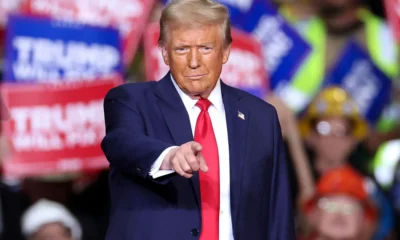

Trump describes US as an occupied country in dark closing message focused on immigration
-


Harris grilled on Fox News on immigration, Biden’s fitness for office
-


Trump campaign tries to push immigration issue over Bill Clinton’s comments on Laken Riley
-


Trump is set to respond to Harris on immigration during his visit to a small Wisconsin town
-


Harris promises tougher immigration, fentanyl controls at border
-


The politics of immigration play differently along the US-Mexico border
-


What we know about Vice President Kamala Harris’ gun
Analysis
Trump allies do damage control as Harris rides fresh momentum post debate
Published
8 months agoon
September 12, 2024Analysis by Stephen Collinson, CNN
7 minute read
Published 12:00 AM EDT, Thu September 12, 2024
Ex-President Donald Trump is equivocating over the possibility of a second debate with Kamala Harris after his dud display in their first showdown prompted his team and conservative media allies to mount a frantic cleanup operation.
It’s far too early to say whether the tangle in Philadelphia substantially changed the race as Harris beseeches remaining movable voters in swing states to ditch the chaos of the Trump era. But in the aftermath of Tuesday’s debate, both campaigns are surveying the impact of a critical clash before more than 60 million viewers eight weeks from Election Day.
Related articleThe long and complex political legacy of 9/11
Trump, who took multiple victory laps following President Joe Biden’s disastrous debate performance in late June, found himself facing the kind of inquest endured by his erstwhile rival. While the ex-president’s campaign will not suffer the same fate as Biden’s shuttered reelection effort, the debate was the latest sign that Trump is still failing to focus on the new challenges posed by Harris and make his own best case.
The vice president was basking in a fresh jolt of euphoria among Democrats who perceive an oft-doubted political figure growing in stature with every test she passes. Harris’ campaign is also leveraging the endorsement of Taylor Swift, which could open a new seam of interest among the pop megastar’s loyal fanbase.
And her allies are reinforcing the tone of mockery and attempts to goad Trump that emerged at the Democratic National Convention and that the vice president carried into the debate. Philippe Reines, a former Hillary Clinton aide who played Trump in Harris’ debate prep, told CNN’s Kaitlan Collins Wednesday that the ex-president has slowed mentally since 2016 and compared him to a “malfunctioning appliance.”
“He was all over the place but to some extent structured,” Reines said, referring to Trump when he took on former Secretary of State Clinton. “Now, he’s all over the board.” He added: “I think he’s losing (his) train of thought and he’s just blurting out the next thing in his mind.”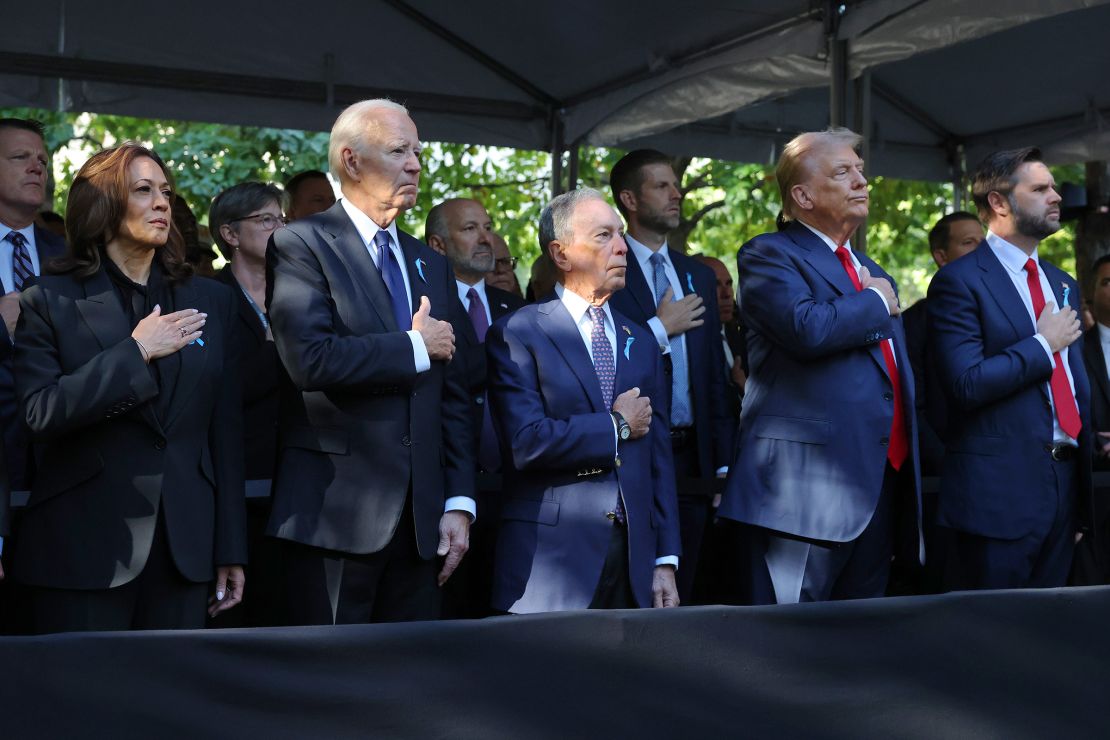
Vice President Kamala Harris, President Joe Biden, former New York City Mayor Michael Bloomberg, former President Donald Trump and Sen. JD Vance attend the annual 9/11 Commemoration Ceremony at the National 9/11 Memorial and Museum in New York City, on September 11, 2024. Michael M. Santiago/Getty Images
A moment of unity
Hours after the debate, the political bile briefly eased as Harris and Trump, along with Biden and Republican vice presidential nominee JD Vance, gathered at Ground Zero in New York to honor the 23rd anniversary of the September 11 attacks in 2001. The general election rivals only met for the first time at the debate, but they shared their second handshake in 12 hours in a gesture of national unity orchestrated by former New York City Mayor Mike Bloomberg.
In a more light-hearted scene Wednesday, a grinning Biden took the extraordinary step of donning a Trump 2024 baseball cap. Andrew Bates, a White House spokesman, said the president gave a hat to a Trump supporter during a visit to a fire station in Shanksville, Pennsylvania, near where the fourth hijacked jet crashed short of its target on 9/11 after a passenger revolt. The Trump supporter had said that “in the same spirit POTUS should put on his Trump cap. He briefly wore it,” Bates said.

But it was only a temporary respite to the bitter fallout from the debate.
The former president did what he always does when presented with unfavorable political facts — deny them. He declared on Fox News on Wednesday that he had “one of my better debates,” despite sweeping negative reviews of his showing. Trump also launched an attack on ABC News, claiming the debate was “rigged” and faulting moderators who fact checked him for setting up a “three-to-one” tag team against him.
But one of his newest associates, former independent presidential candidate Robert F. Kennedy Jr., may have inadvertently highlighted Trump’s deficiencies in the debate even as he tried to praise the ex-president whom he recently endorsed.
Kennedy said on Fox News that while Trump won the debate on “substance,” Harris “clearly won the debate in terms of her delivery, her polish, her organization and her preparation.”
“I think on substance, President Trump wins in terms of his governance,” Kennedy said. “But he didn’t tell that story.”
Still, Trump’s complaints were more eagerly picked up among his longtime boosters in conservative media, underscoring the way that the Republican Party always falls in line behind its leader. However, Trump’s narrative that he was thwarted by two TV anchors sat uneasily with his claim on stage that he’s such an intimidating figure that US enemies were simply scared of him.
Trump was correct in arguing that he was fact-checked more thoroughly than Harris on Tuesday night by moderators who missed several chances to correct the vice president or to hold her to account for dodging questions. But Harris said nothing that compared to the gusher of untruths from the former president, which included a claim that Haitian immigrants in Springfield, Ohio, were slaying and eating residents’ dogs and cats. (That racist claim was debunked Wednesday by Ohio’s Republican Gov. Mike DeWine, who said there was “no credible evidence.”)
Adopting a more sinister tone in his interview with Fox, the former president accused ABC of putting on a “rigged deal” and warned officials “ought to take away their license.” His comments were ominous considering he’s vowed to wage a presidency of “retribution” if he is elected to a second term in November that would include the use of presidential power to punish his enemies.
The former president also Wednesday publicly toyed with the idea of a second debate, after the Harris campaign challenged him to another round. But the former president, smarting from his treatment at the hands of the vice president on Tuesday, doesn’t seem to be in a hurry to renew the performance.
One the one hand, he may have little incentive to show up again given that he was widely seen to have suffered a drubbing on Tuesday. But if the polls show him trailing in the run-up to the election, there might be a rationale for a do-over. The Harris campaign has a similar conundrum. There’s a case for the vice president folding her tent given that she might not be able to repeat Tuesday’s performance.
Trump, however, is trying to change perceptions of the debate after the fact.
“In the World of Boxing or UFC, when a Fighter gets beaten or knocked out, they get up and scream, ‘I DEMAND A REMATCH, I DEMAND A REMATCH!’ Well, it’s no different with a Debate. She was beaten badly last nigh. Every Poll has us WINNING,” he wrote on Truth Social, “so why would I do a Rematch?” As is often the case, the ex-president’s reading of polls was exaggerated. A flash CNN poll performed by SSRS after the debate found that watchers thought Harris put in a stronger performance by 63% to 37%.
History suggests that it takes at least a week for the full impact of a debate to filter down into the electorate. And the fundamentals of the neck-and-neck race with Harris still seem to favor the former president, whose campaign ads are targeting the vice president over the current administration’s record on the economy, including high prices, inflation and immigration, with an intensity and level of focus that Trump as a candidate has come nowhere near matching.
Trump’s running mate has also been more effective at delivering a sharp political message than his boss. He weaved a dismissal of the Swift endorsement for Harris into a wider attack on the vice president on Fox News. “When grocery prices go by up by 20%, it hurts most Americans. It doesn’t hurt Taylor Swift,” Vance said. “When housing prices become unaffordable, it doesn’t affect Taylor Swift or any other billionaire. It does affect middle-class Americans all over our country.”
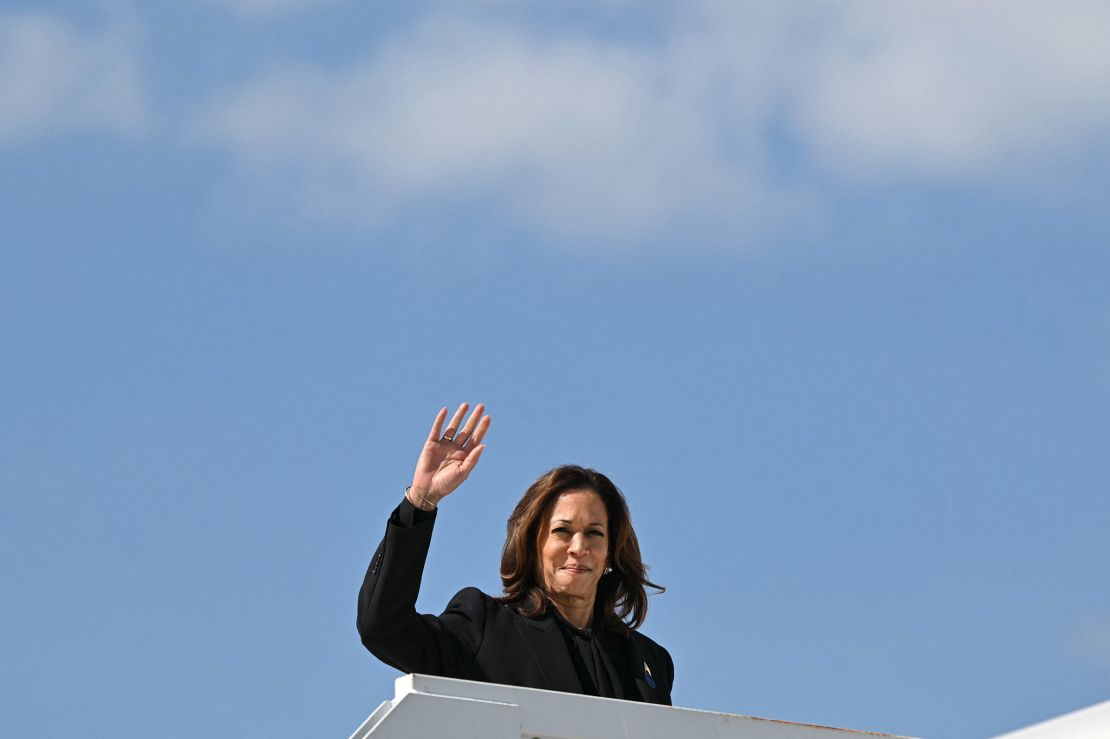
Vice President Kamala Harris boards Air Force Two before departing John Murtha Johnstown-Cambria County Airport in Johnstown, Pennsylvania, on September 11, 2024. Mandel Ngan/AFP/Getty Images
No victory laps at Harris HQ
The challenging political backdrop explains why things are still tense at Harris headquarters in Wilmington, Delaware. A senior campaign aide told CNN’s MJ Lee that the assumption was that the election remained a 50-50 proposition. “It’ll be incredibly close. We cannot take our foot off the gas, even when the moment feels really good,” the aide said.
Harris also faces choices beyond whether she’ll agree to another debate. While her performance was stylistically strong on Tuesday, she still dodged key questions — for instance, the very first one on whether she believes Americans are better off now or when Trump was in office. The Trump campaign is sure to keep up its drumbeat of complaints that she’s avoiding deeper media scrutiny. And there are many signs that voters want more substance from the Democratic nominee.
Several voters who are undecided or leaning toward Harris or Trump, but open to changing their candidate, told CNN’s John King that Harris did well in the debate but several also cautioned she was not sufficiently specific in explaining her policies.
“Kamala Harris says she wants to lift up the middle class, but how?” said Linda Rooney, who lives in the Philadelphia suburbs and voted for former South Carolina Gov. Nikki Haley in the primary. She also voiced concern about Harris shifting her positions on fracking and other issues.
Such doubts are evident in recent national polls too. But they also reflect the fresh complications Trump has caused for himself with his underwhelming debate performance: He may have squandered his best and last chance to expose Harris over those vulnerabilities in front of tens of millions of voters.

US election live: Latest polls show Harris, Trump tied on election eve

Elon Musk’s $1m US voter giveaway to continue, Pennsylvania judge rules

Trump or Harris? Gaza war drives many Arab and Muslim voters to Jill Stein

Joe Rogan endorses Trump on eve of the election

Trump describes US as an occupied country in dark closing message focused on immigration
Trending
-

 The Washington Post7 months ago
The Washington Post7 months agoAre you still registered to vote? How to make sure you’re up to date.
-
Debates8 months ago
Donald Trump Vs Kamala Harris LIVE | The Big 2024 Debate | U.S. Election Latest
-
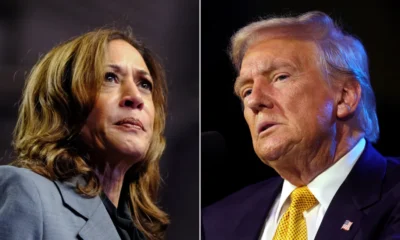
 CNN7 months ago
CNN7 months agoCNN Poll: Harris and Trump are tied in North Carolina, while vice president leads in Nebraska’s 2nd District
-

 CNN7 months ago
CNN7 months agoNew York Democrats are desperate to avoid repeat of their 2022 midterm collapse
-
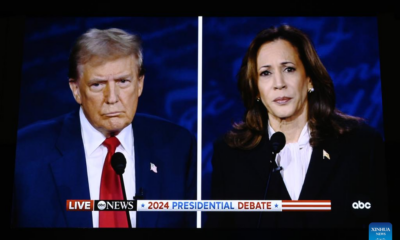
 Donald Trump8 months ago
Donald Trump8 months agoWas Harris’s debate performance enough to win over undecided voters?
-

 Kamala Harris7 months ago
Kamala Harris7 months agoExclusive: Harris to release new economic proposals this week on US wealth creation
-
Debates8 months ago
US election: Blistering exchanges and fact checking in Kamala Harris and Donald Trump debate
-

 CNN7 months ago
CNN7 months agoHarris’ cash edge funds advertising blitz as Elon Musk cuts big check to House Republicans, new filings show




